Virtual Standardized Patient (SP) Training Scenarios for Remote Learning
Virtual Standardized Patient (SP) Training Scenarios for Remote Learning
Ready to level up your online learning capabilities?
Ready to level up your online learning capabilities?
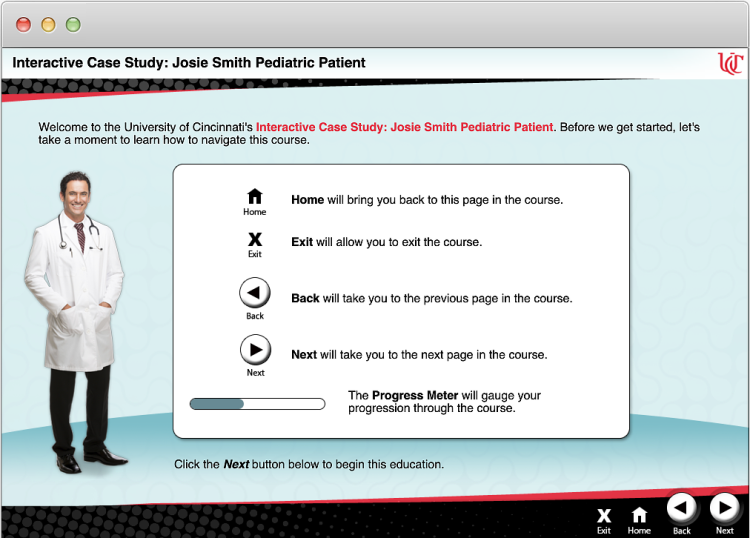
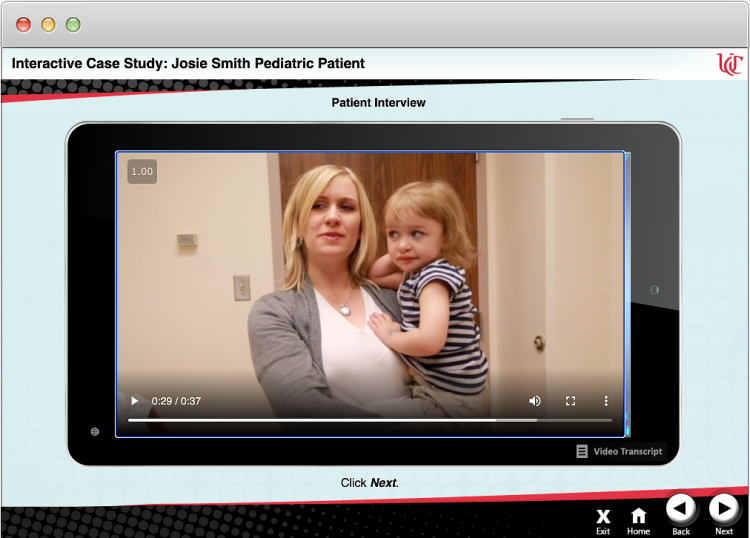
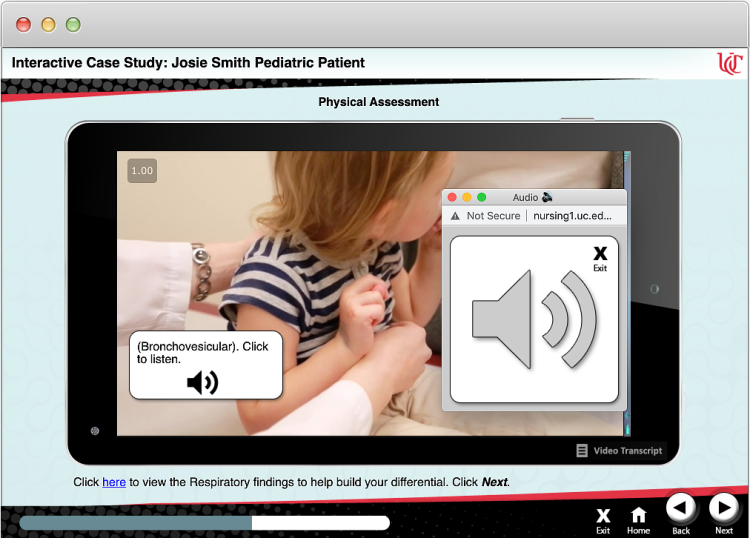
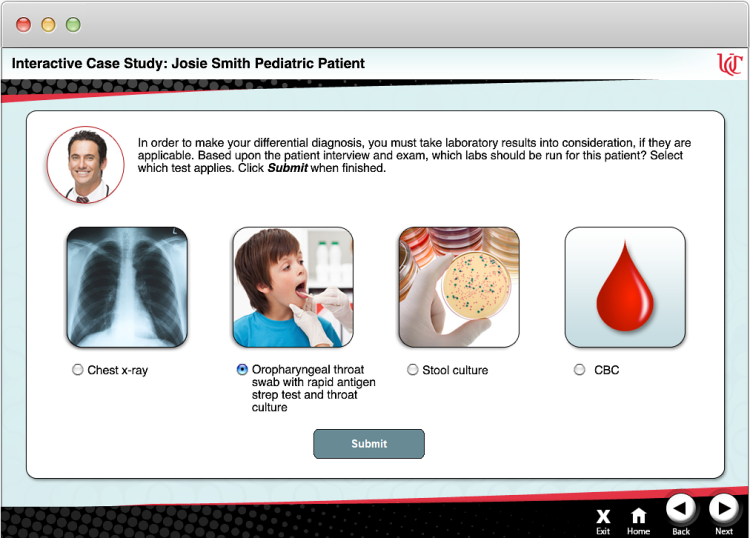
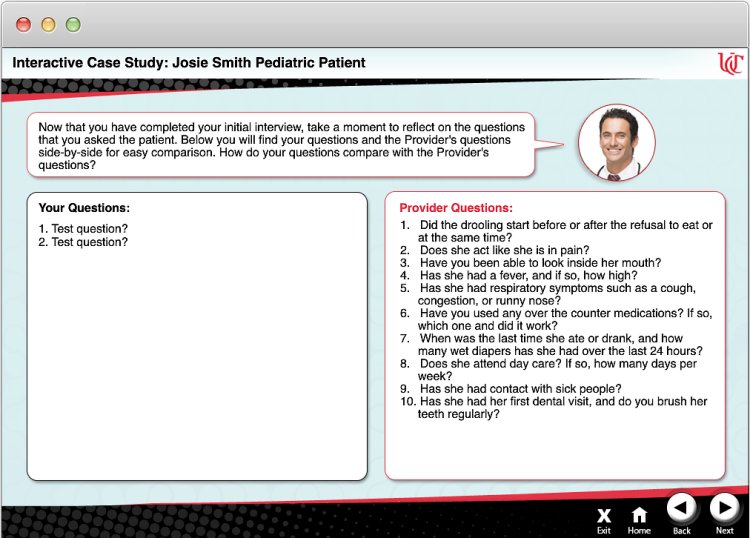
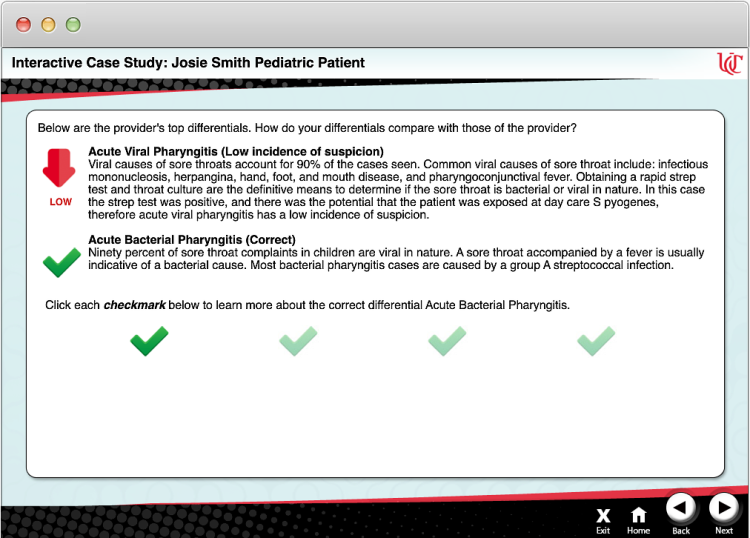
Interactive Case Study


Remote learning has been a steadily growing component of advanced medical, nursing, and allied health education and, with the way healthcare education has continued to evolve along with changing real-world conditions, it is now more vital than ever. Web-based technology supports experiential learning components by replicating patient-care experiences via virtual means as close as possible, including body language, facial expressions, and verbal cues. This type of learning eliminates distance barriers and provides students the ability to experience in-person encounters within a flexible, online environment. With that in mind, the University of Cincinnati College of Nursing – a leader in online education – went to work in designing and developing an award-winning, research-based platform called Interactive Case Study (ICS). They have since partnered with Education Management Solutions (EMS) - a leader in the simulation management and virtual online learning technology space - to bring this solution to the advanced-practice nursing education marketplace. The solution delivers simulated in-person patient care opportunities leveraging virtual standardized patient (SP) cases, while providing for learner reflection, understanding of the rationale behind each decision, and mapping of proper behaviors for communication and physical assessment.
Remote learning has been a steadily growing component of advanced medical, nursing, and allied health education and, with the way healthcare education has continued to evolve along with changing real-world conditions, it is now more vital than ever. Web-based technology supports experiential learning components by replicating patient-care experiences via virtual means as close as possible, including body language, facial expressions, and verbal cues. This type of learning eliminates distance barriers and provides students the ability to experience in-person encounters within a flexible, online environment.
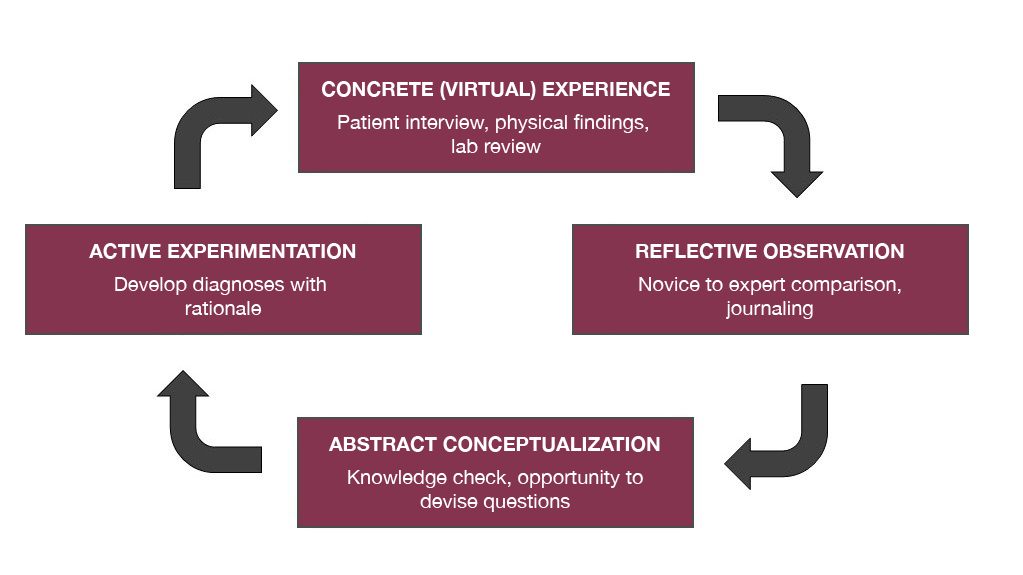

Kolb's Cycle of Learning as the Foundation
With that in mind, the University of Cincinnati College of Nursing – a leader in online education – went to work in designing and developing an award-winning, research-based platform called Interactive Case Study (ICS). They have since partnered with Education Management Solutions (EMS) - a leader in the simulation management and virtual online learning technology space - to bring this solution to the advanced-practice nursing education marketplace. The solution delivers simulated in-person patient care opportunities leveraging virtual standardized patient (SP) cases, while providing for learner reflection, understanding of the rationale behind each decision, and mapping of proper behaviors for communication and physical assessment.
Download the Data Sheet
Download the Data Sheet
What Makes Interactive Case Study So Innovative?
Improved Patient Interviewing Skills
Ask questions and compare them to an expert’s; listen to a patient’s response; learn what questions to ask and why.
Nurture Physical Assessment Techniques
Decide which physical assessments to perform; watch an expert assess the patient; learn the audible and silent signs to address.
Familiarize Students with Laboratory Testing
Examine factors that contribute to testing; determine which laboratory tests to conduct; learn why certain tests are not necessary.
Interpret Differential Diagnoses
Compile and synthesize gathered information; determine top possible differential diagnoses; compare diagnoses with an expert’s.
Measure Learning Through Reflection
Assess confidence as a provider before and after; journal thoughts throughout the process; determine rationale for all decisions.
Interactive Case Study Scenarios - Advance from Simple to Complex
Click on the case scenarios below to view summaries:
Pediatric
- ICS 1: Ear infection (8 year-old boy)
- ICS 2: Strep throat (3 year-old toddler)
- ICS 3: Fifths disease (12 year-old boy)
- ICS 4: Diabetes Mellitus 1 (5 year-old girl)
- ICS 5: Genetic heart disorder (6 month-old infant)
Ear Infection (8-year-old boy)
Case Category - Pediatrics
Case Level - Beginner
Case Summary - Eight-year-old male presents with left ear pain that began two days ago. The pain is worse at night and last night he woke up crying from the pain.
Learning Objectives:
- Utilize clinical assessment skills and review symptoms to determine chief complaint, severity, and aggravating factors, and give a diagnosis
- Interpret assessment data and physical findings to prioritize interventions and deliver a course of treatment
- Communicate effectively with team and patient/family
Strep Throat (3-year-old toddler)
Case Category - Pediatrics
Case Level - Beginner
Case Summary - Two-year-old male presents with his mother who reports that he has been drooling excessively, has refused to eat for the last two days and had a temperature on the previous night to 101 F.
Learning Objectives:
- Utilize clinical assessment skills and review symptoms to determine chief complaint, severity, and aggravating factors, and give a diagnosis
- Interpret assessment data and physical findings to prioritize interventions and deliver a course of treatment
- Communicate effectively with team and patient/family
Fifths Disease (12-year-old boy)
Case Category - Pediatrics
Case Level - Intermediate
Case Summary - Twelve-year-old male presents with a rash “that is not going away” on his face.
Learning Objectives:
- Utilize clinical assessment skills and review symptoms to determine chief complaint, severity, and aggravating factors, and give a diagnosis
- Interpret assessment data and physical findings to prioritize interventions and deliver a course of treatment
- Communicate effectively with team and patient/family
Diabetes Mellitus 1 (5-year-old girl)
Case Category - Pediatrics
Case Level - Advanced
Case Summary - Five-year-old female presents with her parent who reports that for the last two days she has been complaining of abdominal pain and hasn’t been acting like herself. This has been associated with nausea and vomiting.
Learning Objectives:
- Utilize clinical assessment skills and review symptoms to determine chief complaint, severity, and aggravating factors, and give a diagnosis
- Interpret assessment data and physical findings to prioritize interventions and deliver a course of treatment
- Communicate effectively with team and patient/family
Genetic Heart Disorder (6-month-old infant)
Case Category - Pediatrics
Case Level - Advanced
Case Summary - Six-month-old female infant presents with her parent who reports that she is having trouble feeding.
Learning Objectives:
- Utilize clinical assessment skills and review symptoms to determine chief complaint, severity, and aggravating factors, and give a diagnosis
- Interpret assessment data and physical findings to prioritize interventions and deliver a course of treatment
- Communicate effectively with team and patient/family
Adult
- ICS 6: Asthma (40 year-old male)
- ICS 7: Urinary tract infection (25 year-old female)
- ICS 8: Diabetes Mellitus 2 (30 year-old male)
- ICS 9: Heart failure (55 year-old male)
- ICS 10: Myocardial infarction (48 year-old female)
Asthma (40-year-old male)
Case Category - Adult
Case Level - Beginner
Case Summary - Forty-year-old male presents with intermittent, dry, nonproductive cough of three months duration.
Learning Objectives:
- Utilize clinical assessment skills and review symptoms to determine chief complaint, severity, and aggravating factors, and give a diagnosis
- Interpret assessment data and physical findings to prioritize interventions and deliver a course of treatment
- Communicate effectively with team and patient
Urinary Tract Infection (25-year-old female)
Case Category - Adult
Case Level - Beginner
Case Summary - Twenty-five-year-old female presents with a four-day history of burning with urination.
Learning Objectives:
- Utilize clinical assessment skills and review symptoms to determine chief complaint, severity, and aggravating factors, and give a diagnosis
- Interpret assessment data and physical findings to prioritize interventions and deliver a course of treatment
- Communicate effectively with team and patient
Diabetes Mellitus 2 (35-year-old male)
Case Category - Adult
Case Level - Intermediate
Case Summary - Thirty-five-year-old male presents with a rash that he has had for three months.
Learning Objectives:
- Utilize clinical assessment skills and review symptoms to determine chief complaint, severity, and aggravating factors, and give a diagnosis
- Interpret assessment data and physical findings to prioritize interventions and deliver a course of treatment
- Communicate effectively with team and patient
Edema (45-year-old male)
Case Category - Adult
Case Level - Advanced
Case Summary - Forty-five-year-old male presents with progressively worsening lower extremity swelling over the past three weeks. Patient has also noticed worsening shortness of breath and cough.
Learning Objectives:
- Utilize clinical assessment skills and review symptoms to determine chief complaint, severity, and aggravating factors, and give a diagnosis
- Interpret assessment data and physical findings to prioritize interventions and deliver a course of treatment
- Communicate effectively with team and patient
Myocardial Infarction (48-year-old female)
Case Category - Adult
Case Level - Advanced
Case Summary - Forty-eight-year-old female with a past medical history of Type I Diabetes Mellitus presents with lack of energy, which has been progressively worsening for the past two days.
Learning Objectives:
- Utilize clinical assessment skills and review symptoms to determine chief complaint, severity, and aggravating factors, and give a diagnosis
- Interpret assessment data and physical findings to prioritize interventions and deliver a course of treatment
- Communicate effectively with team and patient
Geriatric
- ICS 11: Constipation (70 year-old female)
- ICS 12: Depression (65 year-old male)
- ICS 13: COPD (70- year-old male)
- ICS 14: Stroke (67 year-old male)
- ICS 15: Hip fracture/dementia (73 year-old female)
Constipation (70-year-old female)
Case Category - Geriatric
Case Level - Beginner
Case Summary - Seventy-year-old female presents with the chief complaint of constipation, occasional bouts of diarrhea, and intermittent abdominal bloating.
Learning Objectives:
- Utilize clinical assessment skills and review symptoms to determine chief complaint, severity, and aggravating factors, and give a diagnosis
- Interpret assessment data and physical findings to prioritize interventions and deliver a course of treatment
- Communicate effectively with team and patient
Depression (65-year-old male)
Case Category - Geriatric
Case Level - Beginner
Case Summary - Sixty-five-year-old male presents with a two-month history of difficulty sleeping.
Learning Objectives:
- Utilize clinical assessment skills and review symptoms to determine chief complaint, severity, and aggravating factors, and give diagnosis
- Interpret assessment data and physical findings to prioritize interventions and deliver course of treatment
- Communicate effectively with team and patient
COPD (70-year-old male)
Case Category - Geriatric
Case Level - Intermediate
Case Summary - Seventy-year-old male with a history of controlled hypertension presents with a complaint of increasing shortness of breath, cough, and fatigue over the past few weeks.
Learning Objectives:
- Utilize clinical assessment skills and review symptoms to determine chief complaint, severity, and aggravating factors, and give a diagnosis
- Interpret assessment data and physical findings to prioritize interventions and deliver a course of treatment
- Communicate effectively with team and patient
Stroke (67-year-old male)
Case Category - Geriatric
Case Level - Advanced
Case Summary - Sixty-seven-year-old male presents for an acute visit for left arm and leg weakness.
Learning Objectives:
- Utilize clinical assessment skills and review symptoms to determine chief complaint, severity, and aggravating factors, and give a diagnosis
- Interpret assessment data and physical findings to prioritize interventions and deliver a course of treatment
- Communicate effectively with team and patient
Hip Fracture/Dementia (79-year-old female)
Case Category - Geriatric
Case Level - Advanced
Case Summary - Seventy-nine-year-old female presents with her caregiver daughter who reports that her mother has been refusing to walk since the previous afternoon.
Learning Objectives:
- Utilize clinical assessment skills and review symptoms to determine chief complaint, severity, and aggravating factors, and give a diagnosis
- Interpret assessment data and physical findings to prioritize interventions and deliver a course of treatment
- Communicate effectively with team and patient/family
Schedule a Discussion to Learn More About the Interactive Case Study System
Schedule a Discussion to Learn More About the Interactive Case Study System
Take virtual learning to a whole new level
Take virtual learning to a whole new level
Watch the Webinar
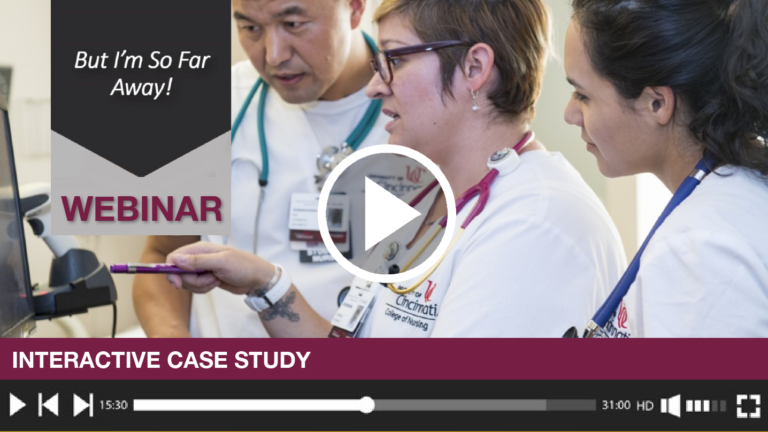
But I’m So Far Away!
Meeting the Challenge of Creating Experiential Learning for Students at a Distance
Join Dr. Colella for this Interactive Case Study (ICS), describing how she solved the problem of creating experiential learning for her remote students. The need to transform a previous face-to-face course to a distant learning format led Dr. Colella into the world of technology. She put together an interdisciplinary team of instructional design and information technology to insure that student learning at a distance provided an experience comparable to that of on-site students.
Watch the Webinar
Watch the Webinar
Meet Christine Colella DNP, APRN-CNP, FAANP
Interactive Case Study Author
Christine Colella is an award-winning nurse educator of more than 30 years. She currently serves as professor and executive director of graduate programs for the University of Cincinnati College of Nursing. In 2017, she was inducted as a fellow into the American Academy of Nurse Practitioners (AANP) and has received numerous other accolades for her work, including:
- University of Cincinnati Provost’s Oustanding Teaching Award (2017)
- American Association of Colleges of Nursing’s Excellence and Innovation in Teaching Award (2016)
- University of Cincinnati Innovative Uses of Technology in Teaching Award (2015)

{TBD} Additional Resources for Your Institution

Lorem Ipsum Dolor Sit
Lorem ipsum dolor sit amet, consectetur adipiscing elit. Ut elit tellus, luctus nec ullamcorper mattis, pulvinar dapibus leo.
Expert Webinars
Webinar archives across a wide range of simulation-based topics with some of the foremost experts in the field.
> Browse Webinars
Case Studies
30+ years of experience in clinical education technology is highlighted in our library of case studies.
> Read Case Studies
Product Videos
An expansive video library showcases our innovative lineup of products and their multi-use feature sets. > Watch Videos
